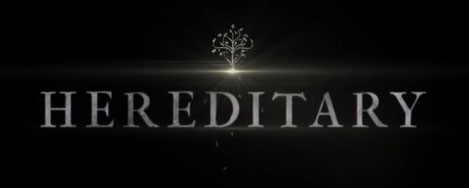
The Mechanism: While watching a horror film, particularly in a theater, they say audiences anxiously laugh to combat a certain dread or apprehension. It is a defense mechanism. It is in our nature to react in such a way because we usually do not want to be in an unsettling state of fright and despair. We rather react in a celebratory manner, especially unifyingly, to allow ourselves to not be overwhelmed. This might not always work for all horror films and most importantly, this might also restrict our enjoyment for the horror genre. Not allowing us to be attentive, when we need to be, will probably remove any aspect of heeding into a film’s plot or story, that would only create a hindered experience. They also say, to tell a good story, you would need compelling characters, with nuances and complexities, and the horror genre is not exempt from this rule.
The Advert: While Hereditary is dividing most filmgoers, there is a certain lure to the film’s marketing. From the set photos to the trailers, it is obvious that A24 is evoking some of its hits, when it comes to their horror films, like The VVitch and It Comes at Night, and those films were specifically designed to create uneasiness, and perhaps perplexities in their characters, in understanding what is happening by being thorough and deliberately quiet. But films like The Shining, Rosemary’s Baby, and Suspiria, have paved the way, prepared us to interpret such mosaic and interesting films. But what if you were not interested in those films that came precedent? Why would we need to watch dozens of films to enjoy one particular film? This is where the film’s writer can connect us to their characters. Allow us to draw experiences of our own trauma, our own fears, our own horrors, so when we are immersed, we are not only immersed in the film, but also immersed with the character’s lives. Although the marketing of the film have been superb when it comes to concealing the character’s motivations and the overall plot, filmgoers probably wanted a different experience. They perhaps projected something more accessible and less broad, something easy to comprehend. And it looks like the main focus of audiences’ gripe is usually the last act of the film.
The Last Laugh: This is where the laughter comes into play. When Annie Graham’s (Toni Collette) chilling revelation happened, filmgoers were either totally into it or 100% resentful of it. They perhaps didn’t appreciate the artistry of director and writer, Ari Aster, has constructed, or they felt they were duped. Either way, it was a bold undertaking. Hereditary is not a family drama dealing with the horrors of grief, suffering, and the uncertainty of our offspring’s future, it is horror, with a capital H, about the dynamics and failures of our family’s uncertainty, and how it is not fully secured, no matter how much you take care of each other, how much money you have, or how loved you are, it’s all uncertain for the future. That’s the connection Ari Aster is building in the film, and yes, there are supernatural elements, but to use the genre in an allegorical fashion, evoke the aforementioned films like The Shining and Rosemary’s Baby, it instills that in our minds, the closest people we love and care for in our lives, can just perish, is truly frightening.
So, the audience laughed instead, not because it was funny, but because they were perhaps concerned about their future. And if laughter is their way to expressed the future they want, a defense for the future’s uncertainty — then who are we to argue otherwise?
Leave a Reply